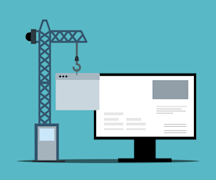How to choose the right CMS?
Today, having a website is essential to reach your potential customers, allow your consumers to purchase your products and services, introduce your company, showcase your expertise, and demonstrate the benefits of doing business with you. But before you embark on designing your next website, it is essential to assess the various CMS (Content Management System) options available to you and consider custom development.
To make the right choices and achieve your business goals with your new website, here are some points to consider.
The primary function of a CMS
Firstly, a CMS is a management system that allows you to structure the contents of your website and to create and run its various features like:
Displaying your products
Shopping online
Describing your services
Presenting achievements
Writing and editing blog posts
Managing your images
Organizing your content
Managing the templates of your various pages
Etc.
Evaluating your needs for your website
There is no perfect CMS suitable for all types of websites. Each CMS on the market has its particulars and functions. Before you start looking for a CMS, you need to know your needs and what you want to do with your website:
Blog
Informational site to present your company
Online store
Discussion forum
Intranet
Etc.
From there, you can already eliminate some CMSs that may not be suitable for your business goals. For example, not all CMSs allow you to create an online store.
Also note that CMSs are constantly evolving to adapt to new technologies, user needs, and new trends. A CMS that you dismissed a few years ago might be the ideal CMS for your website in the near future.
Projecting your activities into the future
Your choice of CMS might also greatly depend on the future you envision for your business. Take the time to ask yourself where you see your company in 2, 3, or 5 years.
Do you plan to have an online store?
Do you want to create and maintain a blog?
Will you have many new products to promote?
Will you need a section with secure access for your clients or partners?
Will you target a multilingual market?
Will you send newsletters?
Considering that a website can have a lifespan of 3 to 5 years, it is important to ask all these questions to ensure that your website will be compatible with your short, medium, and long-term vision.
Planning an operating budget
Among the myriad of CMSs, some are free, others are not, but the majority of CMSs offer paid plugins that provide you with more features to adapt your CMS to your needs. The more plugins you need, the higher your operating costs will be.
Also, if you use a free CMS, chances are you will need some programming knowledge and that you may need to hire a professional to create your website.
Although CMSs generally offer several free themes, customizing your website to stand out from the competition, by modifying existing templates for example, and updates may cost you a few thousand dollars more.
Choosing a CMS supported and used by an active community
After evaluating your needs, projecting your activities, and planning a budget, check that the CMS is supported and commonly used by website creators:
Agencies
Developers
Integrators
Graphic designers
Web writers
Etc.
In this way, you ensure quality support from experienced people in case of modifications to your website, technical updates at the security level, or for adding or developing features.
Also check the evolution of the functionalities of the CMSs to see if they are sufficiently developed to meet your needs. Do not hesitate to also ask website creators their opinion of the different CMSs.
CMS Security
A widely used CMS will generally have a more active watch in terms of security, flaws, and anomalies that may occur. Also, the larger the community of programmers, the more frequent updates aimed at increasing the CMS's security will be.
Determining therequired features for your website and considering custom development
Depending on the scale of your website and the features you want, you may need custom development to adequately meet your expectations and needs. Depending on the chosen CMS, the developers assigned to your new website generally have 2 options:
Develop a feature from scratch
Adapt and enhance an existing feature of a CMS
In the first case, custom development will incur higher costs, but you will be assured of having a feature that fits perfectly with your vision and needs.
In the case of an enhanced existing feature, developers will be able to adapt it to your project. This possibility, however, should be evaluated in detail as it can sometimes be less expensive to develop a custom feature from scratch.
In any case, custom development allows the development of key features that could be reused or adapted in all your company's projects. You only pay once for multiple uses.
Knowing the people who will use the CMS
Who will update your website? A team that is knowledgeable in web (programming, integration, updating, maintenance) or a team of beginners in the field? Depending on the profile of your team, there are 2 major categories of CMS: Headless CMS and Traditional CMS.
Headless CMS
This type of CMS is primarily aimed at developers and experienced teams as it allows more customization of the experience and offers more control over your website's code. However, it offers less control over content display when used by a beginner or someone who is not a web developer.
Traditional CMS
This type of CMS is particularly aimed at users who are not web developers. They will be better able to edit the appearance and content of the site thanks to wysiwyg editors. In this type of CMS, the data is little or not separated from their display. It is a more intuitive and easy-to-understand type of CMS for most users.
Access Management
The CMS must also allow you to easily manage user access to ensure they have access to the sections they can modify or not.
Content Management
Content management must be intuitive and easy for all levels of users for managing:
Multilingual contents
Page templates
Reusable blocks and widgets
Media (images, videos, etc.)
If you need to update your site regularly, the simpler and easier the CMS is to use, the easier it will be for you to edit your contents.
Testing before making a final choice for your CMS
Before making your final decision on the CMS to favor for your website, test it. Navigate through its user interface to:
See if you are comfortable with it
See if its use will be simple for you and your team
Test adding content, changing images, adding products, etc.
Check the support for advanced features (shopping cart, payment processing, user management, etc.)
These tests are all the more important as they will allow you to see if the CMS meets your needs and how your daily tasks will proceed. Especially if you need to update your website regularly.
In summary, you need to consider several criteria to choose the right CMS. Whatever you choose, the important thing is that it is suited to your business. Ready to embark on creating your new website?



